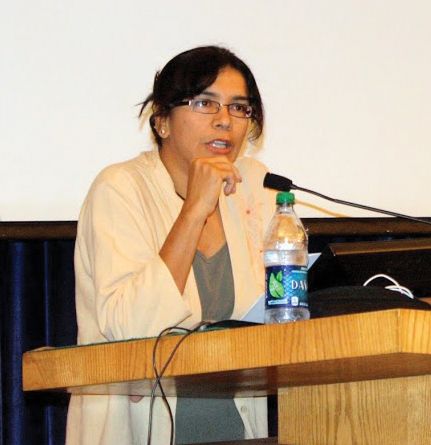
Ashwini Tambe spoke at the Women’s and Gender Studies 25th Anniversary celebration.
The celebration included a reception and a panel, titled “Building Feminist Futures,” which featured six of the field’s most prominent scholars from multiple academic institutions.
“It was an incredibly exciting occasion for feminists to meet, challenge and celebrate each other,” WGST Program Director You-Me Park said.
The panel and round-table discussions aimed to provoke discussions about feminist thought and movements over the past 20 years, according to Park. It also provided an opportunity for participants to reflect on the role of WGST in promoting feminism on campus.
Monica Vizconde (COL ’14), an event coordinator who changed her major to women’s and gender studies after taking an introductory course in the subject, emphasized the unique perspective the program offers.
“WGST allows you to see the world through a different lens,” Visconde said. “Rather than just looking at political courses of action, we explore deeper issues.”
WGST was born out of the Women’s Studies Program, which first began offering a minor in the fall of 1992. Since then, the program’s name changed to Women’s and Gender Studies, and it is now one of the largest interdisciplinary, cross-cultural programs at Georgetown.
WGST currently offers a major and minor to students in the College, while students in the School of Foreign Service can earn a WGST certificate.
Approximately 500 students participate in the program’s courses and roughly 20 to 30 students with either a major or minor in women’s and gender studies every year, according to Park.
Park said that the majority of WGST students are female, and WGST is still a program, not a department. Because of this, WGST receives less university funding than other majors, which limits the scale of events it can organize and the quality of its courses and faculty.
“This program gives me a home, and it saddens me that the program itself does not have a stable one. The fact that professors in the program do not qualify for tenure scares me. We have already lost great professors because of this,” Bonnibel Rosario (COL ’15) wrote in an email. “When I come back to Georgetown as an alumna in three years, I want to see the professors who guided me guiding other students and see Georgetown as a place that embraces their mentorship.”
Madeline Wiseman (COL ’13), who also helped coordinate the event, added that growth and greater awareness about the program are crucial.
“When I say I am a WGST major, I usually get looks of confusion — even contempt,” she said. “But if people took a look at the importance of the issues we study in the context of their own lives, they might not dismiss it so quickly.”
The photo captioned “Women’s and Gender Studies director You-Me Park spoke at the program’s 25th anniversary event,” was incorrectly labeled. The speaker portrayed is Ashwini Tambe. A correction was made at 4:16 p.m. Sunday, Oct. 14.














